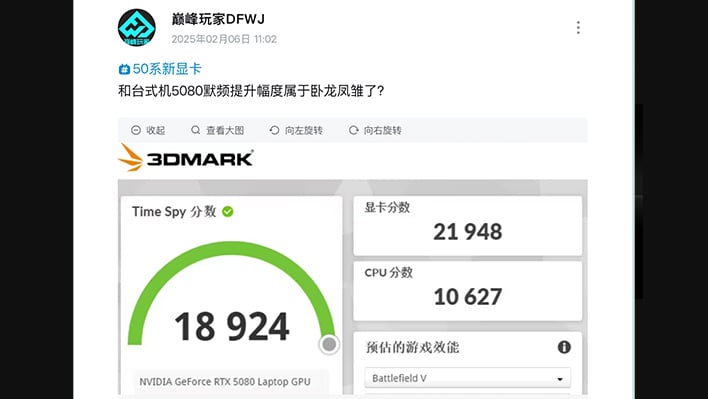GeForce RTX 5080 Mobile GPU Battles RTX 4080 In Laptop Benchmark Leak
Posted on Bilibili, results for the popular 3DMark Time Spy benchmark give us some early numbers to digest. For the overall score, it achieved 18,924, followed by a CPU score of 10,627. Finally, the all-important graphics score was 21,948 for this supposed RTX 5080 laptop. For comparison, last year I benchmarked my stock GeForce RTX 4090 laptop and it achieved a total score of 20,181, with a CPU score of 16,251 and a graphics score of 21,081. This test I ran was on a ASUS ROG Strix RTX 4090 laptop running a 13th Gen Intel Core i9-13900K for reference.
Slightly tuned RTX 4090 laptops were known to hit numbers above 22,000. Even so, the RTX 5080 laptop here seems to do well if it is running at stock clocks. It also beats the mobile GeForce RTX 4080 by around 16% when looking at the average score in 3DMark's database (depending on how you sort the results), but time will tell if the overall performance will outpace GeForce RTX 4090-powered laptops.
One key factor to keep in mind when comparing desktop GPUs such as the RTX 5090, with the mobile variants, is that they differ greatly in specifications. For example, a desktop GeForce RTX 5090 will have 32GB of VRAM, along with a much higher performance ceiling in part thanks to its 575W TDP. The laptop RTX 5090 will be more limited with a TDP that typically tops out at 150W. This is due to the laptop form factor, along with thermal constraints for these mobile chips.
The laptop community has a fairly devoted following, much like the desktop PC overclocking folks. Modded laptops and even BIOS-tweaked overclocking can be commonplace, with often good results. We're curious to see what real world performance ends up being when the laptops release in March of this year.


